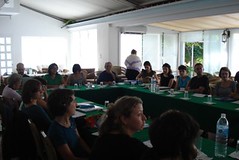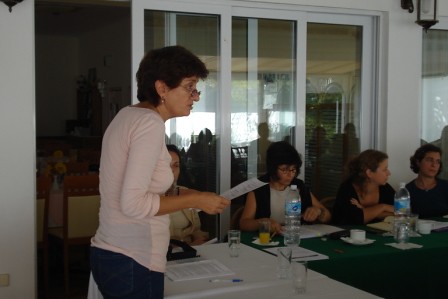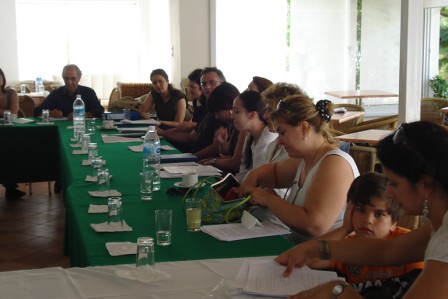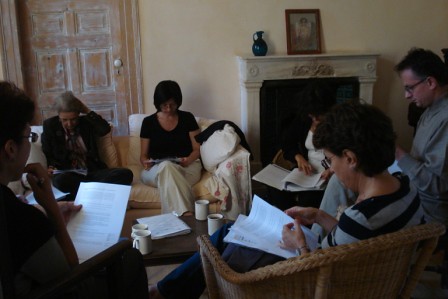
 The second GeMIC Steering Committee Meeting took place in the island of Aegina between the 1st and 3d of October 2008. It was organised by the project coordinator (Panteion University) and was attended by the scientific coordinators and principal researchers of the partner countries as well as by the EC project officer. The purpose of the meeting was the finalisation of the reports on the Context Analysis and Methodology Review and the Policy Analysis work packages and the discussion of the researh methodologies and case-studies for the thematic work of the project.
The second GeMIC Steering Committee Meeting took place in the island of Aegina between the 1st and 3d of October 2008. It was organised by the project coordinator (Panteion University) and was attended by the scientific coordinators and principal researchers of the partner countries as well as by the EC project officer. The purpose of the meeting was the finalisation of the reports on the Context Analysis and Methodology Review and the Policy Analysis work packages and the discussion of the researh methodologies and case-studies for the thematic work of the project.
- An open lecture on “Gender and Intersectionality” given by Dr. Ruba Salih, Senior Lecturer, Institute of Arab and Islamic Studies, University of Exeter and University of Bologna.
- A welcome address and presentation by the EC project officer on the thematic areas of the FP7 open calls.
- Presentations by the members of the Panteion University research team on the WP2 & WP3 draft synthesis reports, code of ethics, project reporting and the project’s website, followed by group discussions.
- Working group sessions on the six specific work packages, during which WP coordinators presented the outline of the thematic field research and further discussed with the partners involved research details regarding methodological approaches, research questions and case studies for fieldwork.
Presentations and discussions
Alexandra Zavos presented the draft synthesis report for WP 2 – context analysis and methodology review. In particular with regards to the WP 2 draft synthesis report, the main points were presented and discussed at length with all partners. Questions and comments were addressed and necessary changes and corrections were noted for finalizing the report in accordance with the other partner’s suggestions. Partners were also encouraged to send any further corrections they would like included in the report.
Helen Kambouri presented a draft synthesis report on European policies regarding gender, migration, and intercultural relations, which was co-written with Maria Stratigaki. The report focused on identifying problem areas and contradictions in policy making in three areas: gender in migration policies, migration in gender policies and policies of intercultural interaction in each one of the partner countries. The commonalities and peculiarities of each partner country were emphasized in order to come to useful conclusions about the region of South Europe as a space of migrant mobility and cultural diversity. During the discussion several issues were raised with regards to the appropriate categories to be studied throughout the project (namely whether issues of minority groups should be taken into account in the assessment of intercultural policies, and whether in anti- trafficking policies, the question of sex work should be taken into account).
Evgenia Moukanou (Panteion University) gave a presentation on project reporting. More specifically based on the “Guidance notes on Project Reporting” she talked about the reporting requirements during the course of the project and she presented the structure and the information required for the Intermediate Project Update Reviews (IPURs) and Periodic Reports (PRs). Partners then asked questions that were answered by the members of Panteion University research team and committed themselves to provide in due time all the information required for the proper deliver of IPURs and PRs.
Alexandra Zavos presented the Code of Ethics, drafted by an external expert commissioned by the GeMIC coordinators, to offer useful guidelines for addressing ethical issues during fieldwork and, later, in the dissemination of project results. The Code of Ethics presented was agreed upon as a general framework of principles, to be consulted and applied in accordance with the particular challenges which research on each thematic work-package entailed. Allowing for flexibility in the application of ethical guidelines was considered paramount to the successful implementation of the project, keeping in mind the vulnerability and need for anonymity that the population under study presents. It was agreed upon that each WP coordinator would draft a short and clear description of the relevant research objectives, to be used in communications with research participants in order to facilitate more in depth understanding of the goals of the project and the benefits to be accrued from it. Finally, it was unanimously agreed upon to forgo the collection of consent forms by individual participants in the research, as this would imperil their full and unhindered engagement.
Parallel working groups – Discussions on the thematic field research
WP 4 National Identity and the Media: The meeting for the thematic WP4 – Representations of National Identity and the Media – was chaired by the WP coordinator Gabriela Iuliana Colipca, and brought together the representatives of the Romanian (UDJG), Greek (UPSPS) and FYROM (EU-BAL) teams who are to carry out research in this field.
In the introductory part of the meeting, the participants agreed upon the most important issues to be discussed namely: methodological approaches, the corpus for analysis, the calendar of the main activities (thematic workshop, national and WP final report delivery).
Therefore, Ioana Mohor-Ivan, who is in charge of the scientific aspects on behalf of the Romanian team, made a detailed presentation of imagology as the methodological approach proposed for the investigation of representations of national identity in the media. She expanded upon and illustrated the basic concepts in imagology (in particular image, stereotype, prejudice), and she detailed the mains steps to be followed in the imagological analysis of a text, whether written or filmic.
The subsequent discussions referred both to aspects of practical application of the imagological methodology and to concrete corpus selection issues. Both the Romanian and the Greek researchers attending the meeting agreed that particular stress should be laid on the study of film as a powerful media instrument of circulating, reproducing but also challenging stereotypical representations of national identity and otherness. In terms of the corpus of films selected for analysis, the participants decided to focus on feature and documentary films produced after 1990 which reflect on the phenomenon of migration and its impact on both the sending and the receiving societies. Special reference was made to the fact that the interpretation of the filmic text should take into consideration the context in which each national filmography developed and explore it in comparative terms in relation – according to the specificity of each national case – to filmic productions from either the international repertoire or issued by the ‘other side’ in the migration flow. As suggested by Maria Paradeisi, the representative of the Greek team, the study could be further enriched by considering, where possible, cultural interaction issues as foregrounded by migrant film directors to be interviewed.
The discussions also revealed essential differences between the three national cases. If, for the Greek and the Romanian teams, the extant film corpus seems to provide enough cases for a relevant study of the representations of national and gendered identity in the context of migration, the task of the FYROM team appears much more difficult with regard to the identification of productions focusing on the status of FYROM as a transit space and on trafficking, in particular. That is why the Macedonian researchers proposed that the discussion on the corpus they could analyse should continue after they had considered more in-depth the possibilities of research offered by their national case; should it not comprise enough filmic material, they would take into account the potential selection of other media text types that would more relevantly represent the peculiarities of the FYROM case.
In the final part of the meeting, the participants decided upon the calendar of the major reporting activities for WP4. The Romanian team coordinating the WP suggested that the thematic workshop in which all partners could present the findings of their preliminary research should be held in May 2009 in Galati, Romania. Having then clarified the last methodological problems and concluded the gathering of the study material, the partners would have to complete and deliver to the WP coordinator their national reports by February 2010, so that the final WP4 synthesis report could be prepared and delivered by May 2010.
WP 5 Intercultural Education: The meeting to discuss the methodological framework for Work Package 6, Intercultural Education, took place at a later date, in Athens, due to the absence of the Work Package coordinator from Cyprus at the steering committee meeting in Aegina. On the 23rd of October, Dr. Zelia Gregoriou, work-package coordinator from the University of Cyprus, along with a member of the Cypriot researach team, Sylvia Michael, attended a meeting in Athens, with Maria Stratigaki (GeMIC coordinator), Alexandra Zavos, principal researcher in Work Package 5 – Intercultural Education, and Helen Kambouri, principal researcher in Work Package 8 – Gender and Violence. Different possibilities for research case-studies were discussed and an initial plan for organizing the fieldwork was considered.
It was agreed upon that implementation of the work-package would involve research in schools, comprising a period of participant observation and subsequent focus groups with students in the classroom, as well as interviews with teachers. The possibility of developing a small-scale action research project with teachers during the fieldwork was considered, providing their interest and willingness to participate.
Applying a methodological framework that utilizes the ‘event’ as a main research approach was considered most conducive to generating unbiased data from the students and teachers. Rather than inquiring directly into students’ opinions of their fellow classmates, and in particular those of foreign origin, it was regarded more productive to record and discuss events occurring in the school where issues of gendered and racial discrimination against migrants, foreigners and ethnic minority students were observed. Organizing different focus groups with students to discuss these events and ellicit their understandings of them will allow the researchers to record and elaborate, together with the teachers, a broader spectrum of students’ perceptions and attitudes regarding the construction and negotiation of ‘otherness’, identity and belonging.
The basic question framing this research will be to understand processes of racialization and genderization in schools that produce ethnicized (and nationalized) borders of inclusion and exclusion, belonging and ‘otherness’. This question was considered most relevant to address issues of developing and practicing social justice in schools, which represents one of the greatest challenges for intercultural education.
WP 9 Transnational and Mixed Families: The discussion started with the presentation of the outline IMIR’s team prepared in advance and which briefly presented the main objectives of the work package, along with the main parameters of the fieldwork and preliminary time-frame. The main criticism of other partners regarding the outline was that it concentrated only on the issue of mixed families and neglected the other segment of the study – the transnational families. A similar problem was mentioned also regarding the methodology review on transnational and mixed families IMIR’s team prepared for Work Package 2, with the difference that the methodology report concentrated too much on transnational families at the expense of the mixed ones. IMIR’s team acknowledged this shortcoming, justifying it with the lack of theoretical literature on the problem of mixed families. The literature available in Bulgaria on this topic is very scarce and mostly empirical in nature. Other partners, especially the Greek ones, promised cooperation in collection of relevant literature and Bulgarian team took the obligation to revise and expand both the methodology report and the WP outline so both would include mixed and transnational families on approximately equal footing.
Another very important point of discussion was how to practically deal with the task set forth in the Description of Work – to simultaneously study two separate and very different phenomena: transnational and mixed families. The discussion showed that the Greek team had a strong interest in both types of families, the Turkish team was more interested in transnational families, while the Bulgarian one preferred to study only the mixed families. In the end compromise was reached that all teams will conduct a study of both family types, but to make it possible within the given financial and time limits, a reduced number of interviews will be made. The proposed number for mixed families is 5-6 families. Ideally, both family members will be interviewed (“family” should be interpreted as broad as possible to include not just legally married, but also those living in cohabitation, same-sex partnerships, single parents who used to have a partner of different nationality). Preferably, family should include children, but this is not a condition. Where feasible, children could be also interviewed, as well as a third person (parents of one or both partners or other relative, sharing the household with them). The Greek team stated that their most likely case studies will include families consisting of Greek men and women from Albania, Bulgaria and the former Soviet Union. Turkish team will most likely study cases of Turkish men marrying women from the former Soviet Union and various Western European countries, and of Turkish women married to men from Western Europe and the USA. In Bulgaria, typical case study will involve a Bulgarian woman married to a man from one of the Arab countries (Iraq, Syria, Lebanon, Jordan).
In case of transnational families, 5-6 interviews will be made with the spouse residing in the country where research is taking place. In case of Greece, this would most likely be a person who immigrated to the country in search of work, leaving the family behind, while in cases of Bulgaria and Turkey, most likely respondents will be spouses of emigrants. Where possible, if at all, efforts will be made to conduct an interview with both partners from one transnational family.
In the end of the meeting, Bulgarian team made the obligation to revise the work package study proposal and to expand the WP2 methodology report so that they adequately deal with the issue of both transnational and mixed families. By the end of December, the theoretical overview of the literature on gender, ethnic and religious relations within the mixed and transnational families should be written, as well as the first draft interview questionnaire and interview guidelines. In January, all teams should conduct one or two pilot interviews to test the draft questionnaire. Dilek kindly proposed to organize the first work package workshop in Istanbul at the end of January / beginning of February 2009 where teams will meet to discuss the results of pilot interviews and to finalize the questionnaires and fieldwork guidelines before the start of the fieldwork in February 2009.
WP 7 Urban Intercultural Spaces and Movements: Members of the group presented the preliminary work already done in the three partner institutions on the directions of research for WP7. There was general agreement that categories like “local”, “local identity” or “borders and boundaries” should be problematised. Some discussion was devoted to whether the fieldwork in the context of GeMIC should focus on private space/s and domestic/care work or on public space/s and social movements. It was agreed that the latter should be prioritized, since a focus on the former would shift the emphasis of the WP. Therefore, in each of the three participating countries/cities a central space (and neighborhood) will be chosen as a field for research to examine how the right to a place is claimed at different levels and how the place is already probably contested by different narratives of belonging. Questions of scale, informal practices and the possibility for an “urban citizenship”, along with, or independent from, national citizenship were also discussed during the workshop as possible questions for reflection. Research methods will include qualitative techniques, such as in-depth interviews (with men and women migrants), focus groups with adults, visual techniques, participant observation, etc. Broad areas of research for in-depth interviews will cover: family history, migration history, use of public spaces, participation in associations, transnational practices. By the end of 2008 the precise guidelines for fieldwork will be decided and fieldwork will take lace between Dec. ‘08 and May ’09. June-Sept ’09 will be devoted to the elaboration of the material and writing of the report, while a thematic meeting is envisaged for Oct. ’09 in Barcelona. Possible group meetings will take place during fieldwork.
Next Steering Committee Meeting
The 3rd Steering Committee Meeting was provisionally agreed to take place in Athens in November 2009, after completion of the fieldwork and successful collection of case-study data in all six thematic work-packages.
You can find some photos from the meeting here.




